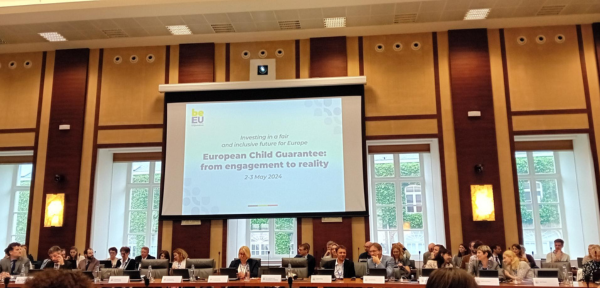EASPD joins advocacy efforts for the conference on European Child Guarantee

On 2 and 3 May, EASPD will attend the Conference “European Child Guarantee: from engagement to reality” organised by the Belgian Presidency of the Council of the European Union.
For this occasion, our network co-signed two critical joint statements coming from two coalitions we are part of. The first one is from the EU Alliance for Investing in Children comprising over 20 European networks dedicated to end child poverty and to promote child well-being across Europe. The second is from the European Expert Group on the transition from institutional to community-based support (EEG), a coalition representing children and their families, people with disabilities and their families, homeless people, people experiencing mental health problems, service providers, public authorities, and UN organisations. The EEG advocates to replace institutionalisation with family- and community-based support.
The Alliance for Investing in Children played a crucial role in the development of the Child Guarantee Recommendation, and it is actively monitoring its implementation. The Alliance statement highlights the imperative to combat child poverty through full implementation of the European Child Guarantee Recommendation. This initiative stresses the urgent need for concrete actions and increased funding to ensure the success of the Child Guarantee, emphasising inclusive stakeholder engagement for lasting impact.
The EEG’s statement focuses on deinstitutionalisation and calls for stronger prevention of child institutionalisation in the Child Guarantee implementation, with a focus on its National Action Plans (NAPs). The statement also states the need for strengthening social welfare and protection systems to prevent unnecessary separation of children from families. Actions to prevent child institutionalisation include developing community-based and family-based services, implementing family-centred Early Childhood Intervention (ECI), providing financial support to families, and enhancing foster care programmes. Furthermore, the EEG calls for meaningful participation of children, caregivers, persons with disabilities, and civil society organisations in NAP implementation and monitoring. It also stresses the importance of data disaggregation across sectors to assess progress and align national monitoring frameworks with EU guidelines. The EEG also recommends fostering exchange among Member States, formulating guidelines for effective deinstitutionalisation and ECI, and leveraging EU financial tools to address drivers of child institutionalisation.
In conclusion, EASPD hopes that this Presidency event serves as a catalyst for Member States to align their efforts towards inclusive practices, ensuring that all efforts will be done to fight child poverty and ensure that every child receives nurturing care within family and community-based environments. By embracing the recommendations outlined by these two statements, Member States can collectively advance the well-being and rights of children across Europe. This proactive approach underscores a shared commitment to fostering inclusive societies where every child can thrive and flourish in a supportive and nurturing environment.

